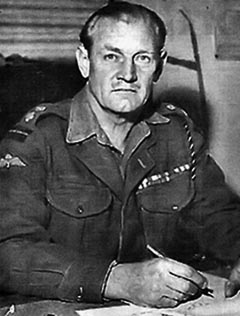 [Historic UK] In wartime, the line between outstanding bravery and outright folly is finely drawn. So too is the line between taking the initiative in battle and taking unacceptable risks. On the whole, survival is the sole judge of which of the two it is.
[Historic UK] In wartime, the line between outstanding bravery and outright folly is finely drawn. So too is the line between taking the initiative in battle and taking unacceptable risks. On the whole, survival is the sole judge of which of the two it is.Jack Churchill (1906 — 1996), sometimes known as "Fighting Jack" or "Mad Jack" Churchill is an outstanding example of how some individual officers fought World War Two in their own way and on their own terms, and succeeded. He led from the front, and his unique skills and boldness contributed to his own survival and that of his troops.
His frequently quoted motto gives a clue to his attitude: "Any officer who goes into action without his sword is improperly dressed". Jack Churchill also added bagpipes and a bow and arrows to his prerequisites for battle.
Churchill was born in 1906 into a background that was very typical for the period. His father held senior administrative and engineering posts in the colonial service, being based at various times in Ceylon and Hong Kong. The family was back in England at Dormansland, Surrey, at the time of Jack’s birth. Although his father’s family came from Oxfordshire, his name, like that of his younger brothers, reflects ancestry on the Anglo-Scottish border and in the Highlands: he was christened John Malcolm Thorpe Fleming Churchill.
Jack and his brothers, Thomas Bell Lindsay Churchill (1907—1990) and Robert Alec Farquhar Churchill (1911 — 1942) would all achieve fame through their exploits in WWII. Like Jack, Tom joined the Manchester Regiment and then the Commandos, becoming a Major-General; youngest brother Robert (’Buster’) became a Royal Navy Lieutenant, serving in the Fleet Air Arm. He died in action in 1942.
Jack Churchill was educated at the Dragon School Oxford, King William’s College on the Isle of Man and Sandhurst. In 1926 he was commissioned into the 2nd Battalion, the Manchester Regiment. The start of an adventurous career began when he joined his battalion in Rangoon and was sent to do a signals course in Poona.
On completion, he drove a Zenith motorcycle 1,500 miles across the Indian subcontinent, crashing into a water buffalo at one point. In Burma, he used to cross railway bridges that had open sleepers by stepping onto the sleepers and pushing his bike along the rails.
While with his regiment he became an excellent bagpipe player under the tutorship of the Pipe Major of the Cameron Highlanders. He was also awarded the first of his service medals: the Indian General Service Medal with Burma Clasp.
Back in England, army life seemed dull and Churchill left in order to travel and build a career as an actor and entertainer. He is said to have had a role in the 1924 film "The Thief of Baghdad", in which he showed off his archery skills. He also represented Great Britain in Norway at the World Archery Championships in 1939.
When war broke out, having remained on the reserve officer list, he was recalled to the colours. His regiment was part of the Expeditionary Force to France. Churchill used his bow and arrows while on patrol, knowing that the bow was an extraordinarily effective weapon in skilled hands as it was silent and accurate up to 200 yards.
When his company was trapped after the Battle of l’Epinette (near Bethune), Churchill killed the first approaching Nazi soldier with his longbow, then used two machine guns to fight back until they ran out of ammunition. He managed to get the remainder of his company to safety by leading them through the enemy lines at night, despite being shot in the shoulder.
March of the Cameron Men